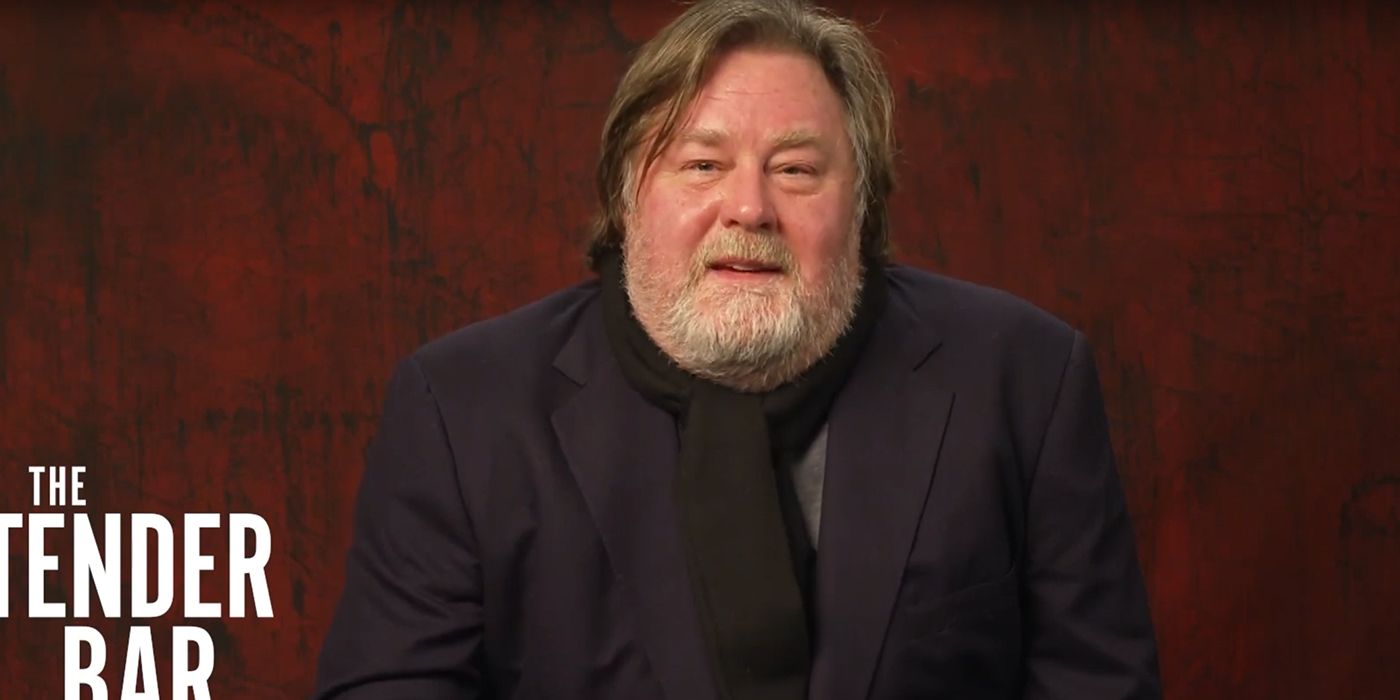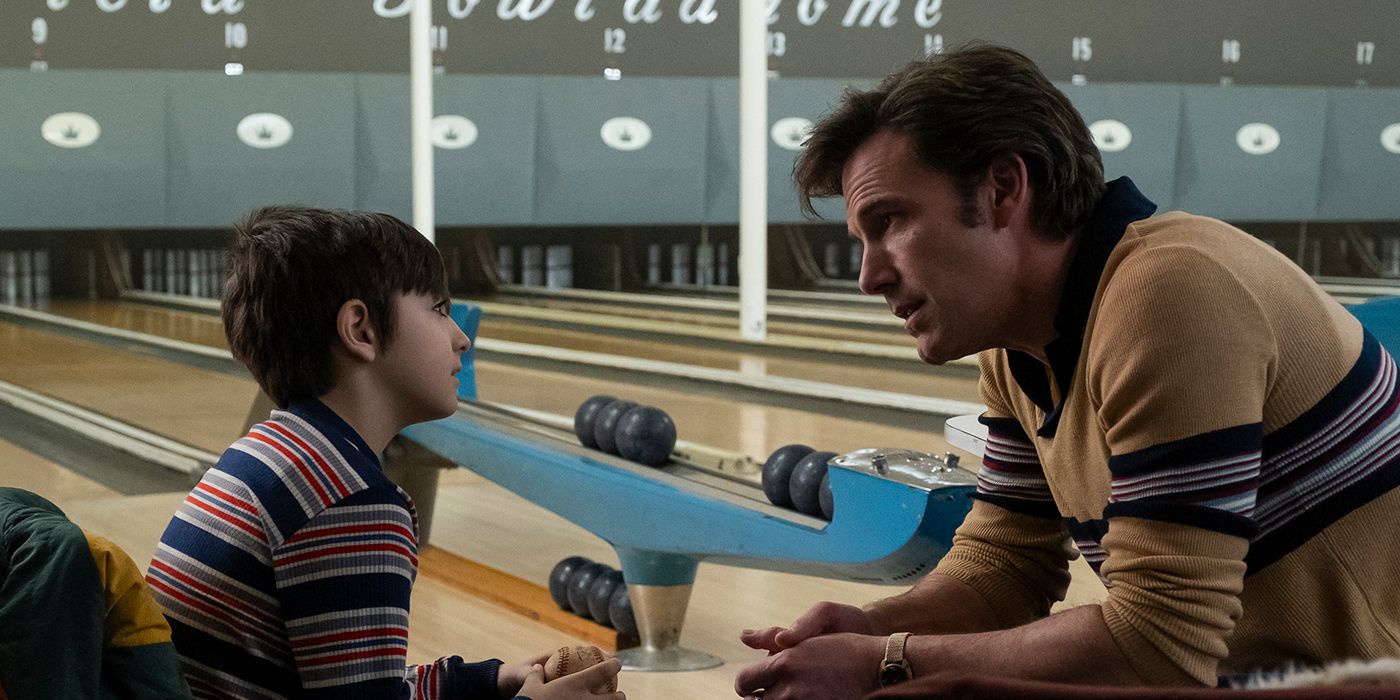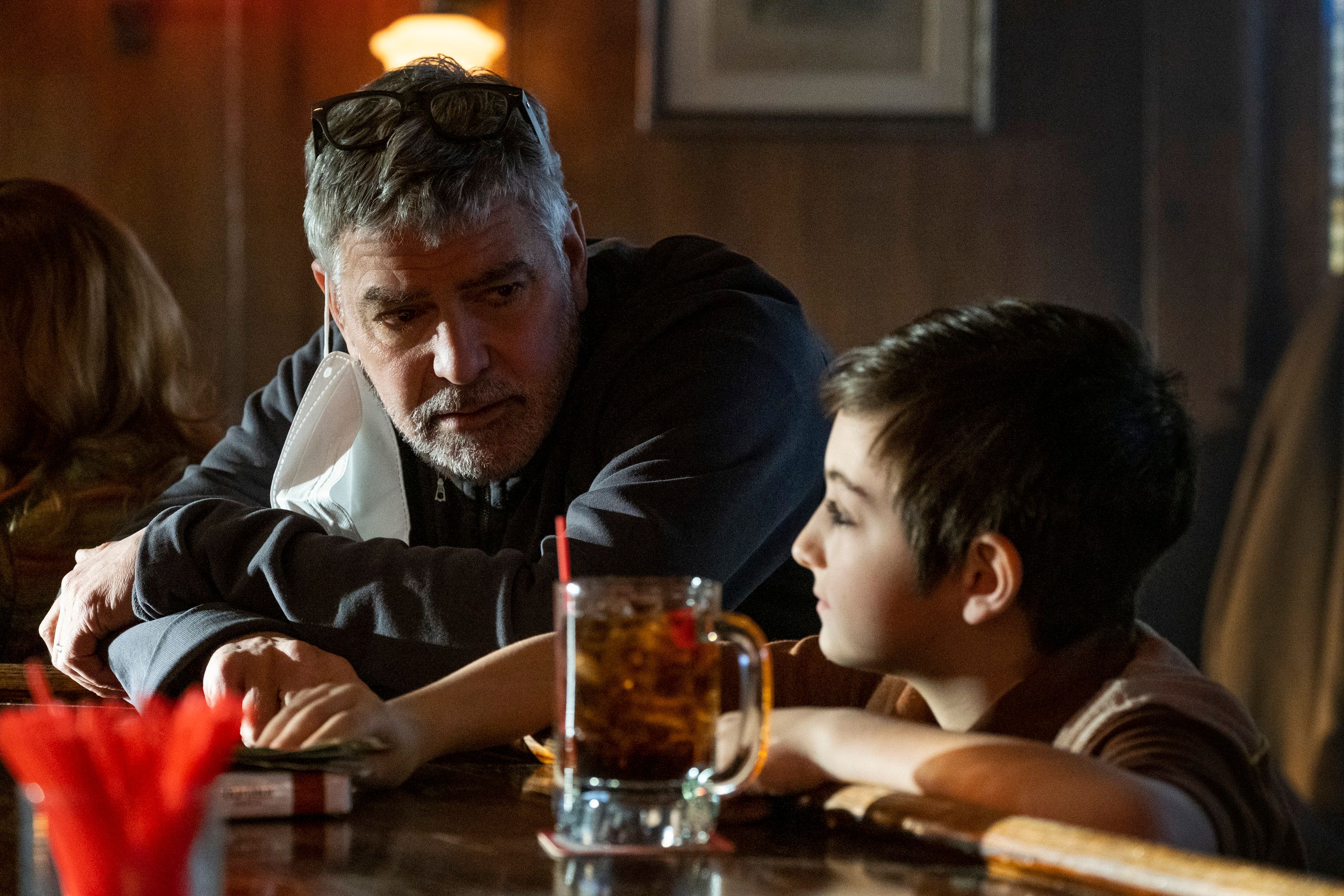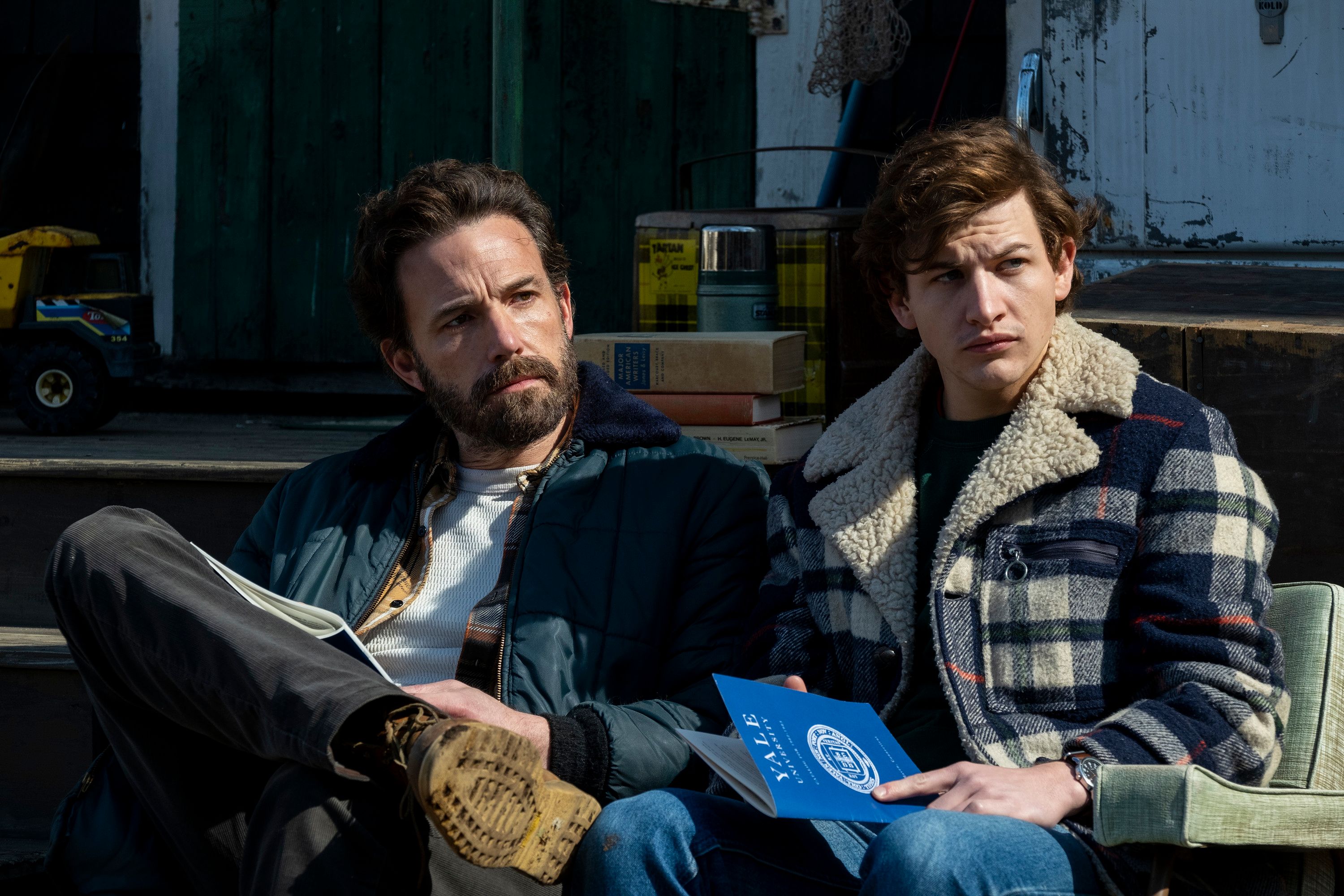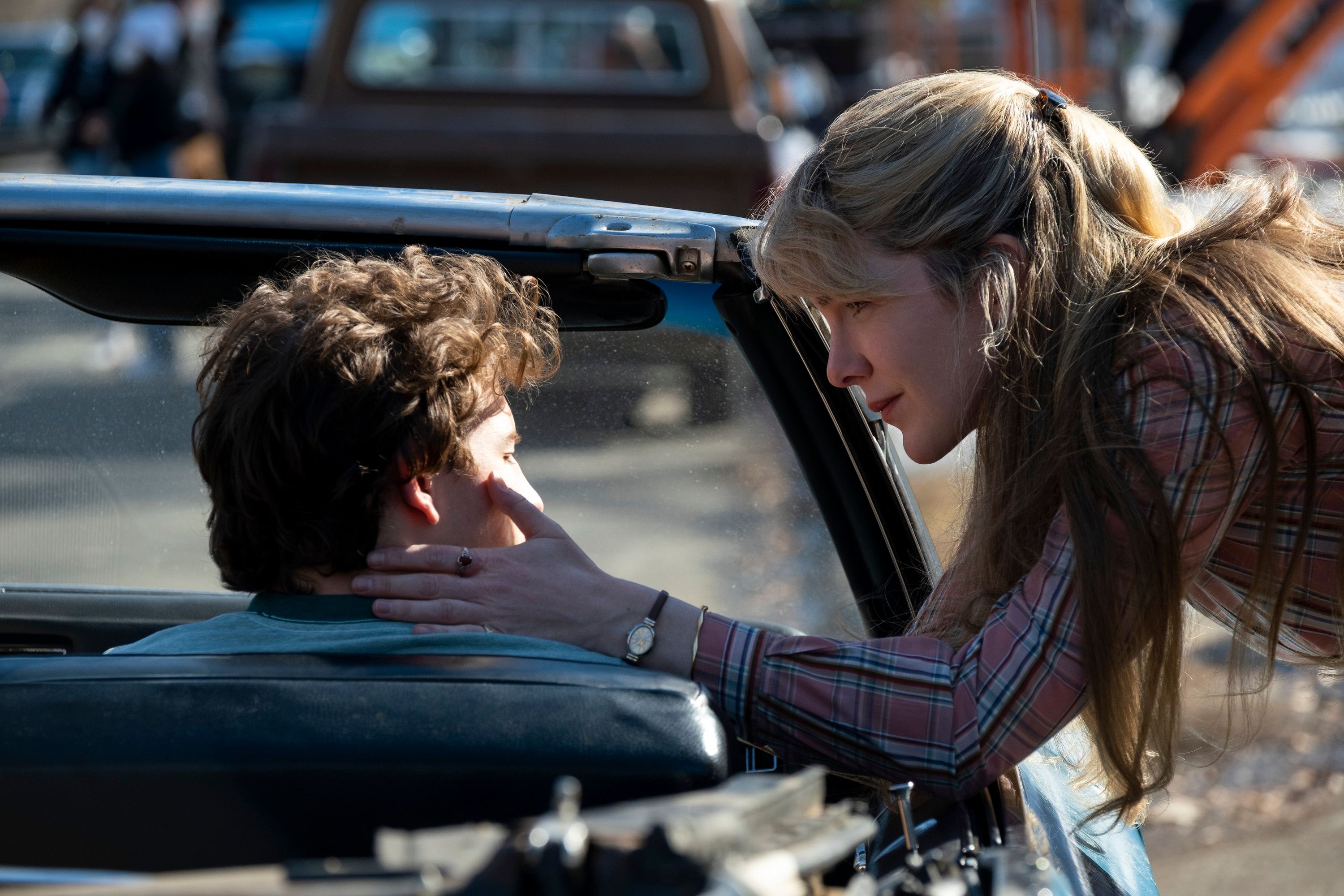With director George Clooney’s The Tender Bar now streaming on Prime Video, I spoke with Oscar winning screenwriter William Monahan (The Departed) about writing the film based on Pulitzer Prize-winning writer J.R. Moehringer’s memoir of the same name. If you haven’t seen the trailer, the Massachusetts-set drama explores the relationship between the fatherless J.R. (Tye Sheridan) and his uncle (Ben Affleck), as they bond at a bar overflowing with colorful patrons. The film also stars Lily Rabe, Ron Livingston, Christopher Lloyd, Max Martini, Briana Middleton, Max Casella. Daniel Ranieri plays the young J.R.
During the interview, Monahan talks about how he got involved in the project, his process for adapting a book into a movie script, how Clooney loved his script and didn’t ask for rewrites, what he’d like to make if he could get the financing for any project, and why he doesn’t like to talk about unannounced projects. In addition, he also talks about writing Neil Jordan’s next film, Marlowe, which stars Liam Neeson as Philip Marlowe, and why they shot Barcelona for Los Angeles in the '30s. For that film he adapted The Black-Eyed Blonde, which was written by Irish novelist, John Banville, who does these books under the pen name Benjamin Black.
Watch what William Monahan had to say in the player above, or you can read the transcript of our conversation below.
COLLIDER: If someone has actually never seen or read anything that you've done, what is the first thing you want them watching or reading, and why?
WILLIAM MONAHAN: I don't know. I want them to think it's good. I'd want them to think it's distinctive, I'd want them to think you can tell it's by me, and I certainly want them to think that it's not many hands Hollywood product or something. It was done by me. An individual human writer.
If you could get the financing to make anything you want tomorrow, what would you make, and why?
MONAHAN: Well, that's an interesting question because that is out there if you actually want to pursue it, and do stuff like that. I think I'd do something probably historical, probably set in the Regency era. Whether it be something along the lines of my Tripoli, which never got made for various reasons, or another thing I had that was set during the war of 1812, in the Pacific Ocean. I think it would be a big thing like that, a big Robert Bolty, David Lean thing, which is where I started from, and which is where I came from.
With all the streamers that are out there now, they're all looking for content. I'm curious because I knew about Tripoli, I've known you've wanted to make that forever. Is it something that you've actually tried? Because I don't know who owns the rights anymore. Is it something that you've actually tried to pursue now that all these streamers are looking for the content?
MONAHAN: No. Because at this point, when you think about it, if I opened it right now, I'd have to completely rewrite it. It was good enough to take everything by storm and get me into the industry, then. But if I read it now, would I like it, would I want to change it? Because mostly artists get worse, sometimes they get better. Right? I think I've had the luxury of getting a little better as a writer and however effective that script was as a, call it a Lawrence of Arabia that really moved, it was sort of a David Lean epic paced like a Bond film. It was good script, it worked, but if I looked at it now, I'd want to do it all over again.
It'd be like somebody looking at an old album they made 20 years ago. You might not be able to stand it. Who was this young punk who wrote this? Look at all the mistakes he made. Or maybe not, I might be surprised. The other thing I'd like to do is a western, a black powder western. I've been messing around with that, and I've been doing little bit of TV, a lot of other things, have a lot of stuff in development. I've learned not to announce it.
Especially these days because if you announce something, all of a sudden, a preconception gels and calcifies about what it's going to be, and everybody predisposed to be critical about stuff is pre-critical about stuff. You don't really have all that much room to move. The mystery and the sacredness is gone.
I've spoken to a number of other people that are more wary of saying things until they're actually going.
MONAHAN: It makes it worse for people in the media because you'd like to really tell people what you're doing. I'd love to tell you what I'm doing, but I'd have to tell you off the record these days because I don't want people banging off about something that's not even started yet.
I've had these conversations with a number of people that, unfortunately, are off the record. Jumping into why I get to talk to you. You are obviously adapting this from a very, very popular book and a critically acclaimed book. What is actually the first steps when you are taking material like that and deciphering it down to what will make ultimately a two-hour movie?
MONAHAN: Well, first of all, the page count is the first thing. First of all, do you love it? Do you think you can do something with it? And the other thing is page count. You have to go from 500 odd pages to 115 or 120 pages. A page being a minute of film and you have to start making selections about what you're going to use and what you can't use, or, I should say, what you're going to have to do without, especially with such a beloved book, beloved by me also, by the way. So, with that, what I've done with the last couple of books I've adapted, I've actually flowed them in into text I can manipulate, and I go through the text, and I cut out what I'm not going to use. I'm not going to use that. I'm not going to use that. I'm not going to use that.
Almost like you're hacking it out of rock. If you were sculpting it, and you end up with what you need, and all the time, you're making notes. Even if you cut something out, you have it in your head, I'm going to use this. So, with The Tender Bar, one of the things was if you look at it as the memoir was, you would have to have three actors playing JR. Because there was a whole section when he was a young adolescent and teenager, and then there was the young man who's getting into Yale, and then there was the boy who goes back to his grandfather's house. And so, the teenager, unfortunately, had to go, and you had to make it work. You had to join those two parts. Have the adolescents in there as an implied thing.
Once George Clooney gets involved, I'm sure he has notes on the script. Can you talk about how you guys work together to ultimately get to what is on screen?
MONAHAN: Well, I'll tell you how we work together. I wrote the first draft, about two weeks later, I heard he was doing it. Okay. And then Amazon green lit the first draft. Apart from a little bit of voiceover, we didn't do anything at all. He just went off and shot it.
That's amazing.
MONAHAN: Yeah. You know it's in the hands of professionals, look at the people involved. He just saw that he had a shooter, which he would adjust to taste and necessity as he went making directorial choices, and he went off and did that, and God bless him for it. Made it very easy.
I was going to say for people that don't understand the industry, what you just said is almost unheard of.
MONAHAN: Yeah. Well, they were ready for it. George and Grant were ready for it because they'd been trying to get the project since it was published 15 years ago. I think Scott Rudin had it, and there may have been various attempts to get it together, and they never happened as so often happens. Then somehow the rights landed at Amazon, and Amazon, Ted Hope at the time, came to me and asked me if I'd like to do it, and I said, of course. Grant and George, who had been trying to get the script for 15 years, were then notified that there was a script now, and they took a look at it, and I guess, according to what they say, read it back and forth to each other on the phone. Don't let me characterize their process though, and decided to do it.
One of the things that I found was Ben Affleck as Uncle Charlie, I felt like he was almost Chuckie from Good Will Hunting 25 years later. There was almost a little bit of that character in there. Not on purpose, but it felt a little like that. Did you notice that? Did you feel that?
MONAHAN: No. I didn't. I think it's coming from the background. If there was some of that, I'd look to myself more than I'd look to him. Uncle Charlie is a type of tough, in Charlie's case literate, which is not the case in the movie referenced.
Oh, that's right. Yeah.
MONAHAN: Uncle Charlie is a tough literate kind of, though their ethnicity is unspecified, kind of literate, tough working-class, Irish guy. No, I don't think so. I can see why you'd see the slight similarity, but he's-
I think it's that scene with the psychologist in the school where I felt a little bit like I was, but misses me reaching.
MONAHAN: Yeah. No. I don't know. I have to tell you, I don't see it.
No. It's totally cool.
MONAHAN: As a type, yes. But I think he's been pretty innovative in it. If it's reminiscent in a good way, that's good.
It's reminiscent in a good way for me. Anyway, let's switch off that. So, if I'm not mistaken, Neil Jordan is shooting Marlowe, which you wrote. What can you tease about that project because it sounds cool?
MONAHAN: Well, it's really cool. It's Neil Jordan doing it, which is good by me. Neil's like, "Bill, do you mind if I write on it a little bit?" I'm like, "No, you're Neil fucking Jordan, aren't you?" So, the answer is yes. I really like him. We met in Ireland. He's off doing this in Spain of all places, Barcelona, Spain with Liam Neeson. He had the genius idea to do 1939 Los Angeles in Barcelona, which still has the trolley tracks, and the old buildings, and its own relics of Spanish, colonial architecture, and looks a little otherworldly in the way that LA would've been at the time. Also, when you get out into the fringes, what would've been the west side in LA, after it became irrigated, it became all jungly hillsides, and things like that. That area of Spain looks really interestingly like the Los Angeles of the 1930s.
For people that aren't familiar with the story, what can you tease them about it?
MONAHAN: Well, it's Philip Marlowe, Raymond Chandler's Philip Marlowe, obviously, but it's not from a Chandler book. It's from the continuation of the Chandler books by the Irish novelist, John Banville, a brilliant, brilliant novelist who does these books under the pen name Benjamin Black. So, John Banville is one of the world's greatest novelists, and you've got one of the world's greatest novelists doing a Raymond Chandler book. I went for that immediately, and it's from a book called The Black-Eyed Blonde, and I called it simply Marlowe in the hope of a series. If you can imagine Liam Neeson as Philip Marlowe, I can. It's one of those things that just hasn't happened before.
The Tender Bar is now streaming on Prime Video.

